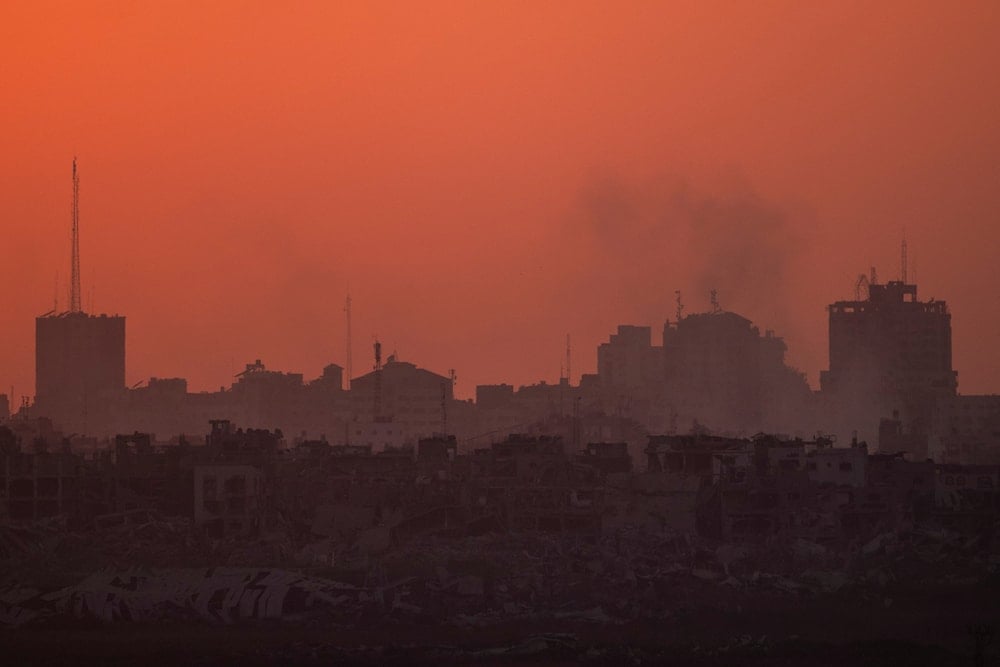US, 'Israel', UAE held secret meeting on Gaza 'day after' plan: Axios
Israeli officials informed Axios that "Israel", the United States, and the United Arab Emirates convened secretly in Abu Dhabi on Thursday to discuss post-war plans for Gaza.
-

Destroyed buildings stand in the Gaza Strip during the sunset, on July 17, 2024. (AP)
Two Israeli officials revealed that the United States, "Israel", and the United Arab Emirates held a meeting in Abu Dhabi on Thursday to discuss plans for the "day after" in Gaza, according to a report by Axios.
The Axios report suggests that Israeli Prime Minister Benjamin Netanyahu is now aware of the necessity to decide on a realistic plan for the "day after".
Regarding the meeting, Israeli officials stated that it was hosted by Emirati Foreign Minister Abdullah Bin Zayed (ABZ). Representing the United States were Brett McGurk, President Joe Biden's top advisor for the Middle East, and Tom Sullivan, a counselor at the State Department. Ron Dermer, the Israeli Minister for Strategic Affairs and a trusted associate of Netanyahu participated in the Israeli delegation, according to Axios.
The officials said that the two senior Israeli security officials who have been working on the Israeli proposals for the day-after plans for Gaza also traveled with Dermer to Abu Dhabi.
UAE conditions
On that note, a day before the Israelis arrived in Abu Dhabi, the Emiratis laid out their proposals for the "day after" the war in an op-ed by ABZ's special envoy Lana Nusseibeh. She advocated for deploying a temporary international mission to Gaza, explaining that this mission would respond to the humanitarian crisis, establish law and order, and lay the groundwork for governance.
On the day of the trilateral meeting in Abu Dhabi, the Emirati official said that the UAE is ready to be part of such an international force and would "put boots on the ground."
There were several conditions presented for that to go through: First, the international force would have to enter Gaza at the formal invitation of the Palestinian Authority. Second, the Palestinian Authority has to conduct meaningful reforms led by a new prime minister who is empowered and independent. Third, the Israeli government needs to allow the Palestinian Authority to have a role in governing Gaza and agree to a political process based on the two-state solution. Fourth, the US would have a leadership role in any "day-after" initiative.
PA refuses foreign influence in Gaza
Earlier this month, the Palestinian presidency rejected "Israel's" proposal for international forces to administer Gaza.
"There is no legitimacy for any foreign presence on Palestinian territory, and only the Palestinian people can decide who governs them and manages their affairs," said Nabil Abu Rudeineh, the official spokesperson for the presidency.
The statement was made in response to comments from an unnamed Israeli security official cited by the Israeli Broadcasting Authority, who stated that the IOF will remain in Gaza until foreign forces take over governance of the Strip.
"We will not accept or allow the presence of a foreigner on our land, whether in the West Bank or the Gaza Strip," said Abu Rudeineh, adding "The Palestinian issue is one of land and statehood, not a matter of humanitarian aid. It is a sacred cause and the central issue for the Arabs."
It is worth noting that earlier on Tuesday, 14 Palestinian factions signed an agreement to set up an "interim national reconciliation government" to govern the emergency situation that followed the Israeli occupation's genocidal war against the Gaza Strip and the increased pressure and tensions across the West Bank.
According to China's Foreign Minister Wang Yi, the Palestinian factions including Hamas and Fatah met in Beijing this week and committed to "reconciliation".
"The most prominent highlight is the agreement to form an interim national reconciliation government around the governance of post-war Gaza," Wang said following the signing of the "Beijing Declaration" by the factions in the Chinese capital.

 4 Min Read
4 Min Read








